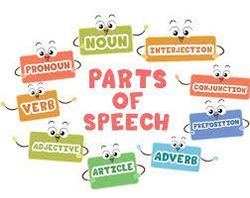Jul 7, 2022
Parts of Speech

1.NOUNS
(Name, People, Places, Things, Animals, Food)
EG: Boy; Dog; Apple
2.PRONOUNS
Can replace nouns
We, Himself, I, Us
3.ADJECTIVES
Describes noun or pronoun
You generally find them before nouns and pronouns
EIGHT ADJECTIVES (WORD ORDER/SYNTAX)
1.Quantity (a number)
2.Quality (good, bad)
3.Size (big, small)
4.Age (new, old, young)
5.Shape (round, square)
6.Colour (yellow, black, green)
7.Origin (where? Italy? China?)
8.Material (metal, cotton, leather)
I bought five, nice, big, old, long, blue Italian leather couches.
4.VERBS
(A)Action done by or to a noun - eat, sleep, work
(B)State of being - is, was, am
PLUS With Adjective - hot, nice, sick, happy
5.ADVERBS
Describes the action of verbs
Generally, adverbs are found after the verb, but before the adjective it modifies.
1.I ran quickly to my house.
2.That watch is so expensive.
TYPES OF ADVERBS:
1.Adverb of Manner - How something happens - slowly
2.Adverbs of time - When something happens - yesterday
3.Adverbs of place - Where something happens - everywhere
4.Adverbs of degree - Amount/How much - so, very, too
1. The simple definition of a noun is: a person, place or
pronoun
thing
2. To decide if a word's a noun, look at its ending, position and
function
first letter
3. A word is almost certainly a noun if it ends with
-ness
-est
4. Which is a noun?
govern
government
5. In which sentence does a noun follow a determiner?
The food's delicious.
It's delicious food.
6. In which sentence does a noun follow an adjective?
Their team played well.
It's a good, strong team.
7. Nouns often come after one or more
adjectives
adverbs
8. Nouns often function as the subject and/or object of
an adjective
a verb
9. "She plays guitar." The noun "guitar" is the
subject of the verb
object of the verb
10. In which sentence is the subject a pronoun?
England is cold now.
You'll need warm clothes.
1. An adjective is a word that tells us more about
a verb
a noun
2. In the language of grammar, adjectives ________ nouns.
modify
activate
3. "These flowers are beautiful!" Which is an adjective?
these
beautiful
4. "His new apartment's nice, but it's a bit small." How many adjectives are there?
two
three
5. An adjective usually comes BEFORE a noun or AFTER
a verb
a noun
6. In which sentence does a verb come between a noun and the adjective that modifies it?
The movie was boring.
It was a boring movie.
7. Adjectives modify nouns, and they can also modify
verbs
pronouns
8. "She's very smart, so the exam was easy for her." Which modifies a pronoun?
smart
easy
9. Which endings are often found on adjectives?
-able, -ful, -ous
-ness, -ment, -ity
10. "This quiz is harder than the others." The adjective "harder" is
superlative
comparative
1. An adverb is a word that can tell us more about
a noun
a verb
2. Adverbs can also modify
adjectives and other adverbs
pronouns and other nouns
3. "Our team will win the game easily." Which is the adverb?
will
easily
4. Which are adverbs describing "how" someone worked?
quickly, slowly, badly
quick, slow, bad
5. Which are adverbs describing "when" someone worked?
often, yesterday, afterwards
morning, afternoon, weekend
6. Which are adverbs describing "where" someone worked?
office, factory, home
locally, here, everywhere
7. "The boys were really dirty." The adverb "really" is modifying
an adjective
a verb
8. "They spoke incredibly quickly." The adverb "incredibly" is modifying
a verb
another adverb
9. "Cheetahs run really fast, but they tire quickly." This sentence has
two adverbs
three adverbs
10. "Suddenly, this loud noise made everyone jump!" The adverb "suddenly" is modifying
a whole sentence
two different verbs
By undefined
6 notes ・ 4 views
English
Elementary